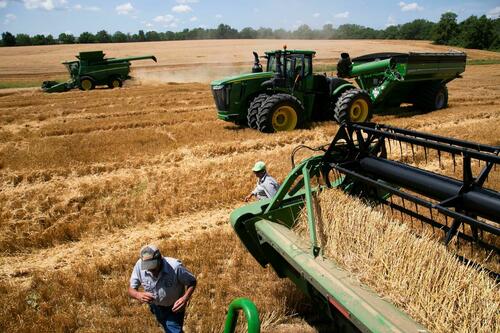..energy nationalism then food nationalism?
..tough for inflation to retrace substantially if food inflation stays high. Weather is not something Powell can control. And everyone needs to eat, so demand destruction won't help. And when food gets expensive, labour will ask for more pay.
..An urgent action required by Fed Govt to boost food production locally...free up land, encourage more people into farming, interest free loans for food production, diversify food production locations and financial incentives for key food producers lifting production above targets.
"It Is Very Serious": War And Weather Threaten To Send Food Prices Even Higher
BY Zero Hedge
SATURDAY, JUL 02, 2022 - 09:25 AM
US agriculture executives are warning that war and extreme weather have put global food supplies in danger as skyrocketing food prices have led to shortages and protests worldwide.
"We’ve actually got two crises," Erik Fyrwald, CEO of pesticide and crop-seed maker Syngenta, told the Wall Street Journal. "The food-security crises and the climate crises."
According to Fyrwald, extreme weather has been on the rise - including heat, drought and flooding which have affected farmers in America, Europe, Australia and India. On top of that, world grain and fertilizer markets have been disrupted by the war in Ukraine - which normally exports roughly one-third of global wheat supply - a figure projected to be cut in half this year according to the USDA.
Rising food prices are prompting unrest, as disruptions in the flow of crops from Ukraine compound existing stress on global supplies of grains and other goods. The head of the United Nations World Food Program has warned outright food shortages are possible in 2023 if Russia continues to block Ukraine’s crop exports.
Even among the world’s wealthiest countries, higher food prices have been taking a toll. U.S. grocery prices in May rose nearly 12% over the past 12 months, the largest annual increase since April 1979, according to the Labor Department. Prices increased 7.4% at restaurants and other food venues outside the home, also marking a more-than-four-decade increase. -WSJ
"It is very serious," said Fyrwald, who added that food prices "will keep going up until and unless we can get product out through the Black Sea in the south of Ukraine."
That said, wheat prices have come down 27% since Russia's invasion drove them to record levels in March.
"There is just not going to be enough supply of certain ingredients," Florian Schattenmann, CTO for Cargill, said during a Tuesday Journal event, adding that the war in Ukraine has put pressure on things such as sunflower oil - forcing companies to scramble for substitutes.
On Monday US Agriculture Secretary Tom Vilsack spoke at the Journal event, where he said that Russia was destroying grain production in Ukraine. "They are making it hard for farmers to plant and grow their crops," he said, while calling for Ukrainian ports in the Black Sea to reopen in order to get grain out of the country and help ease the food supply crunch - in part because trading must resume so that packed grain silos can free up storage space for this year's harvest. Vilsack added that the US needs to find ways to increase its own crop production.
In South America, poor weather has made it more difficult for the agricultural sector to make up for shortfalls in world food supplies given the situation in Ukraine, while in the United States, the Midwest has been forced to slow its planting season for corn and soybean due to wet and windy conditions in the Midwest, while farmers in Western states are grappling with drought that's affecting more than 78% of the region. In California, farmers have been bulldozing thousands of acres' worth of almond orchards and shuttering decades-old dairies.
As conflict continues, Mr. Fyrwald said Syngenta is working with farmers in Ukraine but also continuing to supply Russian farmers with seeds and chemicals. Some agriculture companies, including Syngenta and Bayer AG, and grain traders, such as Cargill, have continued to sell seeds and handle crops in Russia despite pressure to sever ties after the invasion of Ukraine. Companies cite humanitarian grounds for their decisions to keep operating certain parts of their business in Russia, which is expected to increase its wheat exports from a year ago, according to the USDA.
“Snygenta has looked at it and decided that we serve farmers everywhere in the world,” Mr. Fyrwald said. “We are not political.” -WSJ
According to the USDA's Vilsack, the US needs to look for new ways to boost crop production.
"Every generation of Americans get tested," he said, adding that the aftermath of the pandemic, weather phenomenon, and the war in Ukraine are "significant challenges, but there is significant capacity for us to emerge stronger."
- Forums
- ASX - General
- Its Over
..energy nationalism then food nationalism? ..tough for...
- There are more pages in this discussion • 7,978 more messages in this thread...
You’re viewing a single post only. To view the entire thread just sign in or Join Now (FREE)





